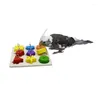For wild bird enthusiasts, providing high-quality food is essential for attracting a wide array of feathered visitors. When selecting wild bird food, it’s important to look for blends that contain a variety of seeds such as sunflower, safflower, and nyjer. Fruits and berries are also crucial for providing essential vitamins and minerals, so keep an eye out for blends that have these included. Insects such as mealworms and crickets are also an important part of many birds’ diets, so choosing a blend with these nutritious additions is important. Don’t forget about nuts and legumes which provide additional nutritional benefits. Finally, consider adding supplements and additives such as probiotics and vitamins to further enhance the nutritional value of your wild bird food. By choosing a diverse blend of high-quality ingredients, you can ensure that your feathered friends are getting all the nutrients they need to thrive.






High-quality seeds
Firstly, let’s discuss the benefits of different types of seeds commonly found in bird food. Sunflower seeds are one of the most popular choices among birds and bird enthusiasts. These seeds are high in fat and protein, making them an excellent source of energy for birds, especially during the winter months when food is scarce. Another popular seed is safflower, which is known for its bitter taste that deters squirrels and larger birds, making it a favorite among smaller bird species. Nyjer seeds, also known as thistle seeds, are tiny black seeds that are highly nutritious and favored by finches and other small songbirds. Each of these seeds offers unique benefits and can attract a diverse array of bird species to your feeders.
Now that we understand the benefits of different seeds, it’s important to know how to identify high-quality seeds in bird food. One of the first things to look for when purchasing bird food is the freshness of the seeds. Fresh seeds will have a strong, nutty aroma and vibrant colors. If the seeds appear dull or have a rancid smell, they are likely old and not suitable for feeding wild birds. Additionally, high-quality seeds should be free from debris, dust, and filler ingredients. Look for bird food that contains pure seeds without any added fillers or preservatives. This ensures that the birds are receiving the most nutritious and natural food possible.
Another factor to consider when identifying high-quality seeds is the presence of shells and hulls. Some lower-quality bird foods may contain a high percentage of shells and hulls, which can be wasteful and unappealing to birds. Opt for bird food that contains a minimal amount of shells, allowing birds to easily access the nutritious seeds inside.
It’s also essential to consider the storage and packaging of the bird food. High-quality seeds should be stored in airtight containers to maintain their freshness and prevent moisture and pests from contaminating the food. Additionally, reputable bird food brands will provide clear and transparent packaging, allowing consumers to see the quality of the seeds before making a purchase.
Fruits and berries
Fruits and berries are a great source of carbohydrates, which provide energy for birds to fly and hunt for food. They are also rich in vitamins and minerals that are important for maintaining good health. For example, blueberries are high in vitamin C, which helps boost the immune system and prevent infections. Similarly, oranges contain vitamin A, which is crucial for maintaining healthy eyesight in birds.
When shopping for bird food blends, it is important to look for those that contain an adequate amount of fruits and berries. Some common ones include cranberries, cherries, raisins, and dried apples. These fruits not only provide nutrition but also add a delicious flavor to the food, making it more appealing to birds.
In addition, it is important to ensure that the fruits and berries are of high quality. Fresh or freeze-dried fruits and berries are better options than those that have been processed or contain added sugars. This is because processed fruits and berries may have lost some of their nutritional value during processing, and added sugars can be harmful to birds’ health.
It is also worth noting that not all fruits and berries are safe for birds to consume. Some fruits, such as avocados, grapes, and citrus fruits, contain toxins that can harm birds. It is important to familiarize oneself with safe and unsafe foods before feeding birds.
Nutritious insects
Insects are a natural and essential part of the diet for many wild bird species. They are not only a source of high-quality protein but also provide essential fats and nutrients that are crucial for birds’ overall health. Insects are particularly important during the breeding season when adult birds need to provide their young with a high protein diet for proper growth and development. Additionally, insects are also an important food source for migratory birds during their long journeys, providing them with the energy they need to sustain their flights.
When choosing wild bird food, it’s important to look for options that include nutritious insects such as mealworms and crickets. These insects are widely recognized as excellent sources of protein and are readily consumed by a variety of bird species. Mealworms, in particular, are a favorite among many backyard birds, including bluebirds, robins, and wrens. They can be offered dried or live, and both forms are equally nutritious for birds. Crickets are another popular insect choice for wild bird food, and they are especially favored by ground-feeding birds like sparrows and towhees.
In addition to choosing wild bird food that includes nutritious insects, it’s also important to consider the quality of the ingredients. Look for wild bird food that is free from fillers and additives and contains a high percentage of insects. Avoid products that are primarily made up of seeds and grains, as these may not provide the same level of nutrition as those containing insects. It’s also important to ensure that the wild bird food you choose is fresh and free from mold or contamination.
When offering wild bird food that includes nutritious insects, it’s important to provide a variety of feeding options to attract a diverse range of bird species. Consider offering different types of feeders, such as platform feeders for ground-feeding birds and suet feeders for insect-eating species like woodpeckers and nuthatches. Providing a water source nearby can also attract more birds to your yard.
Nuts and legumes
One of the main benefits of nuts and legumes is their high protein content. Protein helps to support muscle growth and repair, making it vital for wild birds during breeding season when they need extra energy to care for their young. Additionally, protein is crucial for supporting the immune system, ensuring that wild birds stay healthy and strong.
Another benefit of nuts and legumes is their healthy fat content. Fat is a critical component of a wild bird’s diet as it provides them with energy and helps to keep them warm during cold weather. Additionally, healthy fats are essential for maintaining healthy feathers, which are vital for insulation and protection from the elements.
Finally, nuts and legumes are an excellent source of carbohydrates, providing wild birds with a quick source of energy. Carbohydrates are especially important for migratory birds who need to maintain their energy levels during long flights.
When selecting wild bird food containing nuts and legumes, there are several tips to keep in mind. Firstly, look for a variety of nuts and legumes in the mix, including peanuts, almonds, walnuts, and soybeans. This variety ensures that wild birds are getting a diverse range of nutrients and flavors, increasing the likelihood that they will continue to visit your feeding station.
Secondly, check the ingredients list for any added sugars or artificial additives. These can be harmful to wild birds’ health and should be avoided if possible. Instead, opt for natural, unprocessed foods that mimic what wild birds would find in their natural habitats.
Finally, consider the form in which the nuts and legumes are presented. Some wild bird food mixes contain whole nuts and legumes, which can be difficult for smaller birds to eat. Instead, look for a mix that contains chopped or crushed nuts and legumes, which are more accessible for all bird species.
Supplements and additives
One popular supplement is added vitamins. Many bird foods include vitamins A, D, E, and B complex, which can help support the immune system, promote healthy feathers, and aid in digestion. However, it is important to note that excessive amounts of certain vitamins can be harmful to birds, so it is crucial to choose a food with appropriate levels.
Probiotics are another beneficial additive to consider. These live microorganisms can help maintain a healthy balance of gut bacteria in birds, which can aid in digestion and boost overall health. Probiotics can also be helpful in reducing stress during times of environmental change or illness.
Other additives to look for in wild bird food include minerals such as calcium, which is essential for strong bones and eggshells, and electrolytes like sodium and potassium, which can help regulate bodily functions and prevent dehydration.
When choosing a wild bird food that includes these supplements and additives, there are a few considerations to keep in mind. First, make sure to choose a reputable brand that uses high-quality ingredients and has a good track record of producing safe and effective bird food.
Additionally, it is important to select a food that is appropriate for the specific species of birds you are trying to attract. Different birds have different dietary needs, so it is crucial to choose a food that meets those requirements.
Finally, carefully read the labels and ingredient lists to ensure that the food contains the specific supplements and additives that you are looking for. Some brands may advertise added vitamins or probiotics, but may not actually include them in significant amounts.
In summary, adding supplements and additives to wild bird food can greatly enhance the nutritional value of their diet and promote overall health and wellbeing. When choosing a food with added vitamins, probiotics, and other beneficial additives, be sure to select a reputable brand that meets the dietary needs of the specific birds you are trying to attract. By providing a well-balanced and nutritious diet, backyard bird enthusiasts can help support the health and happiness of their feathered friends.
FAQ
Q1. What are the top 5 nutritious ingredients to look for in wild bird food?
The top 5 nutritious ingredients to look for in wild bird food are sunflower seeds, nyjer seeds, peanuts, mealworms, and suet. Sunflower seeds provide a rich source of protein, fiber, and healthy fats. Nyjer seeds are high in protein, fat, and fiber, making them an excellent source of energy for birds. Peanuts contain high amounts of unsaturated fats, protein, and fiber, which help promote healthy feathers and strong immune systems. Mealworms are packed with protein, making them an essential ingredient for fledglings and young birds. Finally, suet is a great source of energy and helps protect birds from the elements during colder months.
Q2. Can I mix different types of bird food together?
Yes, you can mix different types of bird food together. In fact, mixing various types of bird food will provide a more diverse and balanced diet for your feathered friends. However, ensure that you do not mix too much food together as it may cause waste or become stale. It’s best to mix small amounts of food together and replenish the supply daily to keep it fresh.
Q3. Do I need to provide water with bird food?
Yes, it’s crucial to provide fresh water along with bird food. Birds require water to help digest their food and maintain their health. Make sure to clean and refill the water bowl regularly to prevent bacteria growth and provide a safe and healthy environment for birds to drink.
Q4. How often should I feed my wild birds?
You should feed your wild birds every day, especially during the winter months when natural food sources may be scarce. Provide fresh food and water daily, and remove any uneaten food to prevent attracting unwanted pests. Additionally, consider placing multiple feeding stations around your yard to reduce overcrowding and let every bird have a chance to eat.
In conclusion, providing nutritious bird food is essential to attract and support a wide range of local bird species. Always ensure that you feed your birds a variety of food and supplement their diet with fresh water. By following these simple steps, you’ll create a welcoming environment for birds to thrive and enjoy in your backyard.

